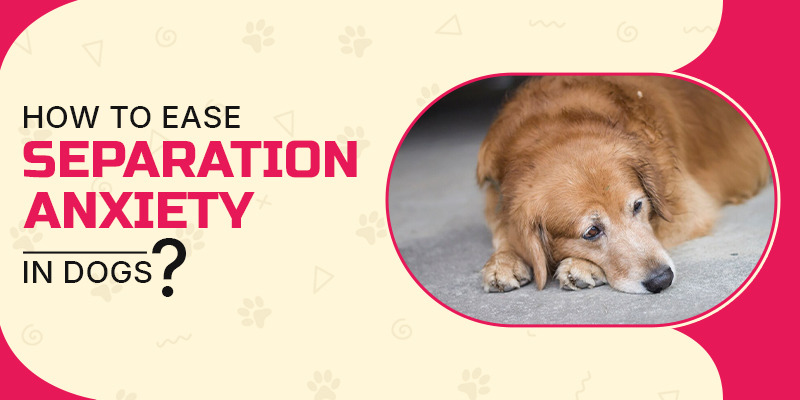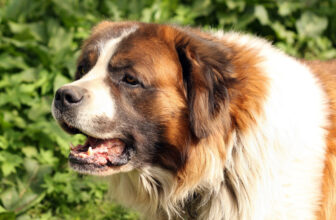
Check out our latest products
Dogs bring unwavering kindness and unconditional love into our lives. Unfortunately, we don’t get much time to spend with our furballs due to our busy schedules. At times, we are so occupied that we don’t get to see them at all, making our animal companions feel left out or unattended. This may trigger separation anxiety in the dog, leaving them stressed and anxious.
In this blog post, we will dive into the details about what separation anxiety is, its symptoms and how to deal with this condition. Let’s get started!
What is dog separation anxiety?
Separation anxiety in dogs refers to a mental state of fear of being separated from their human guardians, fellow animals or sometimes a place they are attached to. This can cause dogs to think they are abandoned and leads to stress or anxiety and changes in their behavior. Dogs with separation anxiety usually get overwhelmed when they are reunited with the separated individual or the place.
What are the signs of separation anxiety in dogs?
Dogs exhibit various signs when suffering from separation anxiety; let’s have a look at the most common symptoms:
- Whining
- Pacing
- Excessive drooling
- Destructive behavior
- Loss of appetite
- Vomiting
- Shivering
- Aggression
- Depression
- Urinating or defecating at home
How to help a dog with separation anxiety?
Mentioned below are some easy ways that can help you ease your dog’s separation anxiety and keep them calm:
Positive reinforcement
When you return home, act normally and let your dog calm down until you jump to them, indicating your return a routine thing. Reward them for their patient behavior only after they are calm by providing lots of treats, toys, cuddles and praise.
Mental & physical exercise
A lot of physical and mental exercises not only promote your pet’s overall physical and emotional well-being but also tire them out and let them sleep before you leave. Play puzzle games, take your dog for long walks or play fetch for at least 30 minutes before you leave.
Provide a safe and comfortable crate
Providing proper crate training is a great idea to help your furry friend deal with separation anxiety. Make them perceive it as a safe, comfortable and relaxing refuge. You can begin by providing your furry mate with their favorite toys, treats and soft bedding when they are inside the crate. Once they get accustomed to the crate and start associating it with every activity such as eating, sleeping, relaxing, etc., use the crate when you are away.
Follow the same schedule
Sticking to the same schedule for all your activities around your pet, such as eating, walking, playing, etc., will let your dog know what to expect when including your leaving time. This will make them accustomed to you not being around during a certain period.
Keep arrivals and departures quiet
Try to keep your entry and exit from home as quiet as possible. Don’t wave goodbye before you leave. Also, wait for your dog to come to you once you return home instead of jumping on them while they are spending their time alone. This will help them get accustomed to the fact that there is no big deal in their guardians leaving or coming home and there’s nothing to feel anxious about.
Make use of calming supplements
If you find your dog getting anxious or stressed even after your conscious efforts to keep them calm, consider using calming products after consulting with your vet. Anxitane Chewable Tablets, PAW Complete Calm Multivitamin Chews, etc. are some of the popular dog anxiety and behavior supplements.
Final Words
Separation anxiety is a very common problem in dogs but the good news is, it can be managed with patience and consistency. Equip yourself with the information provided in this blog and keep your dog calm and composed during stressful situations. Speak to your vet for tailored recommendations.
Explore More : 7 Simple Ways to Help Your Pet Live Longer and Happier

David joined CanadaVetCare in 2013 as a product analyst and veterinary assistant. Being a passionate pet lover and keen animal health researcher, David had always found ways and solutions to help pet parents to improve their pets’ health. He is always happy to answer pet health-related queries and recommending pet parents for the right pet product for their furry companions.







![[5G & 2.4G] 2K Indoor Security Camera for Home Security, AI Voice Change for 2-Way Talk, Motion Detection, Night Vision, 24/7 SD Recording/Cloud Storage, WiFi Home Camera, Pet Cam with Phone App](https://i3.wp.com/m.media-amazon.com/images/I/61I2U+sTT3L._AC_SL1500_.jpg?w=300&resize=300,300&ssl=1)






